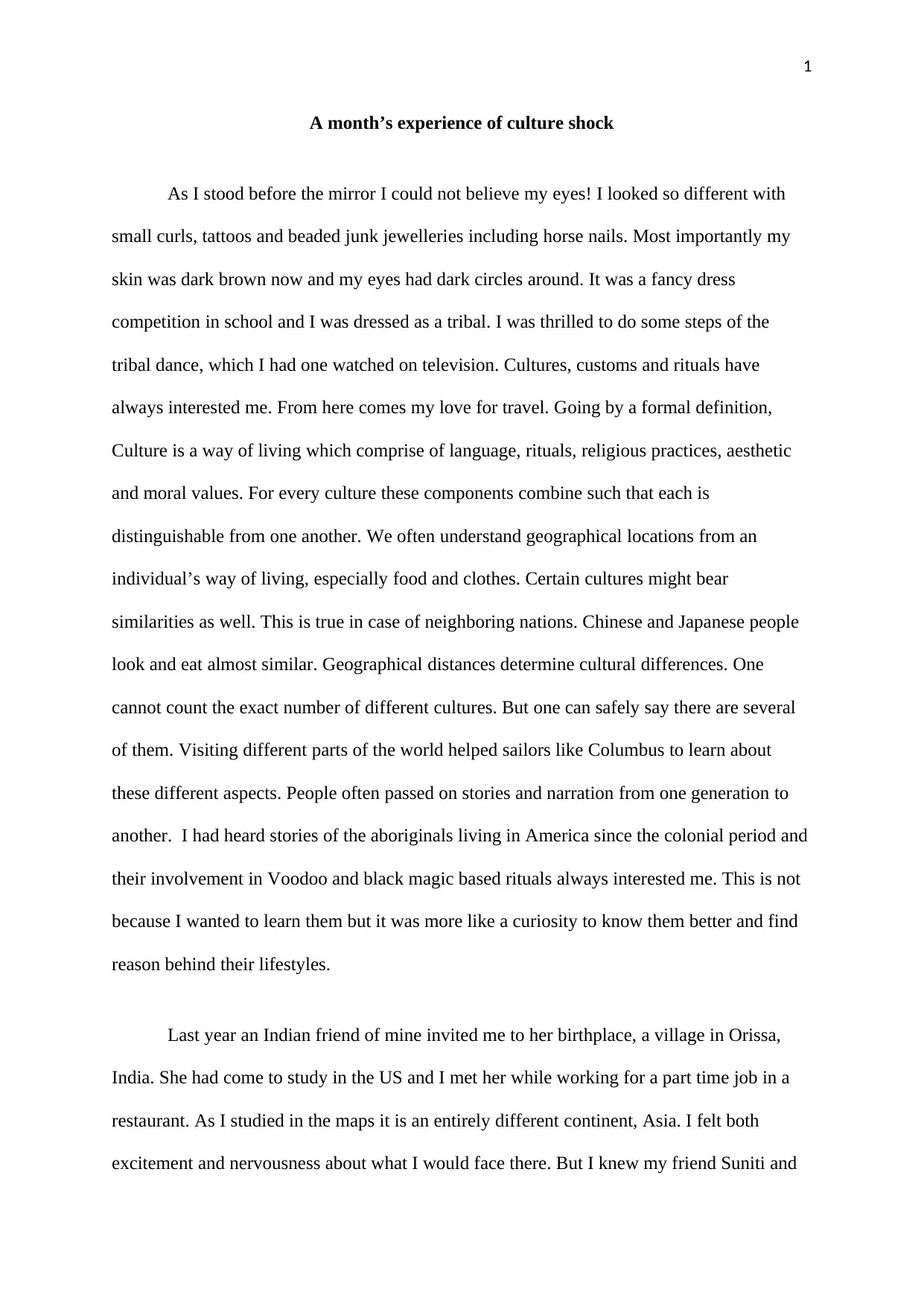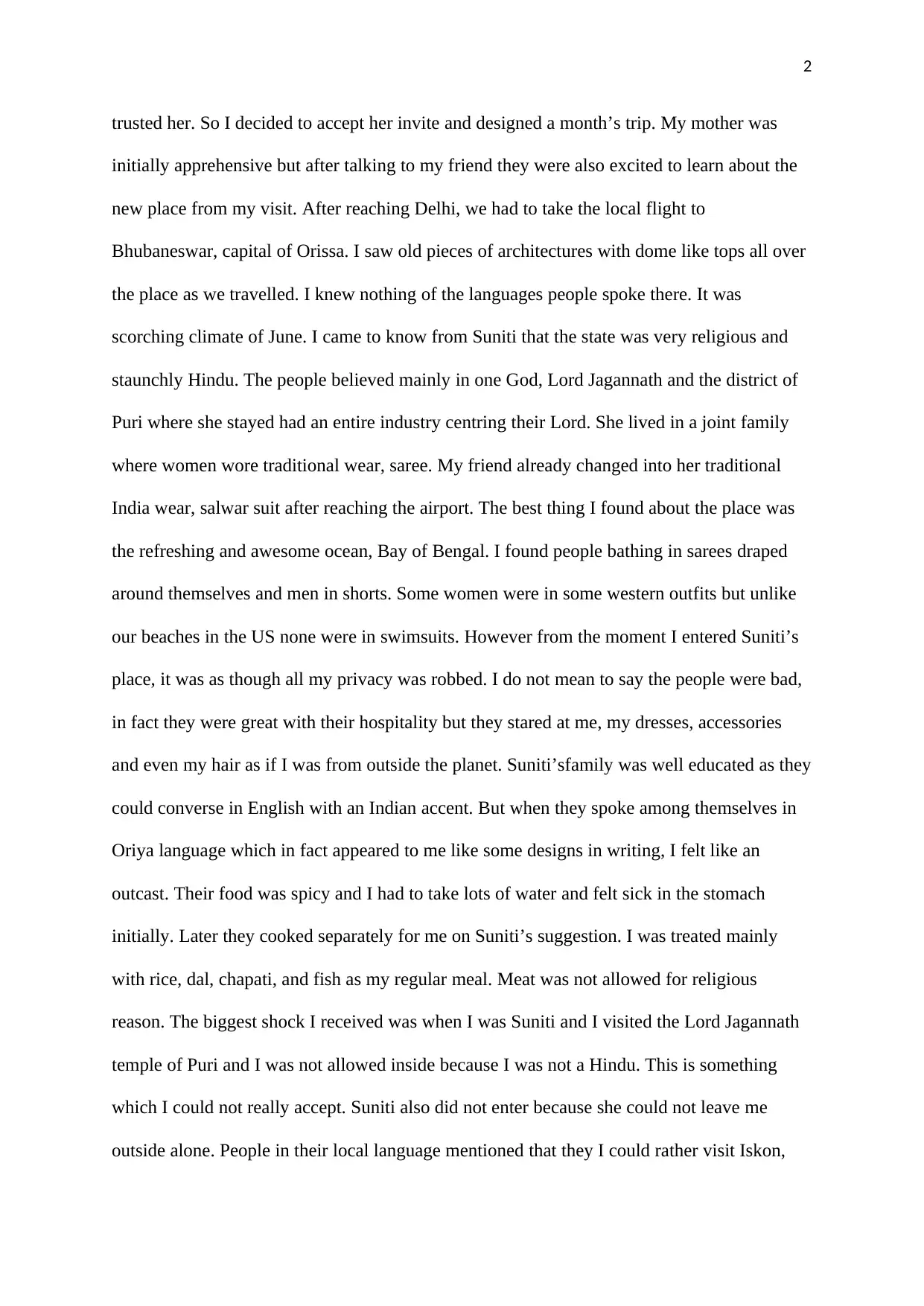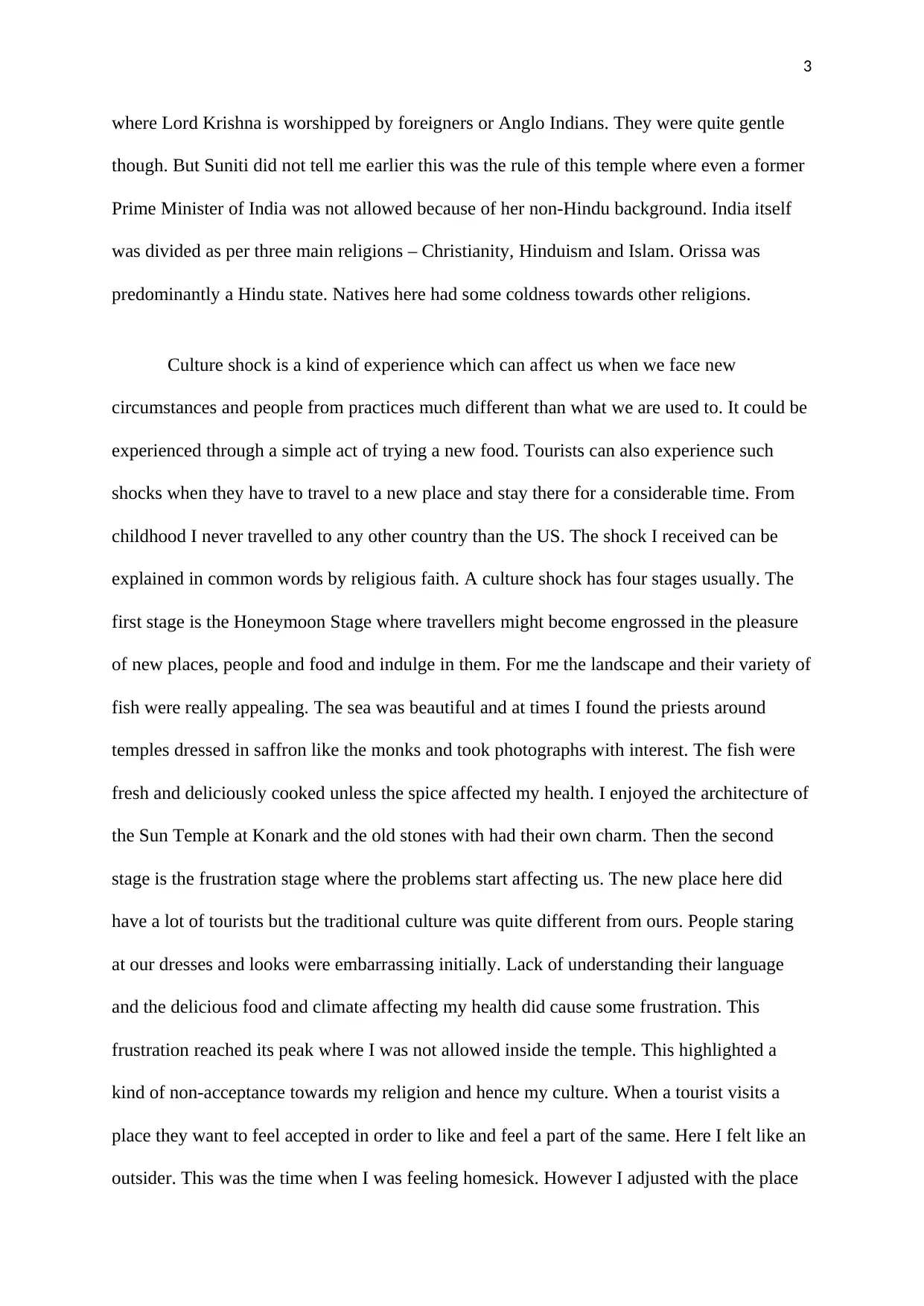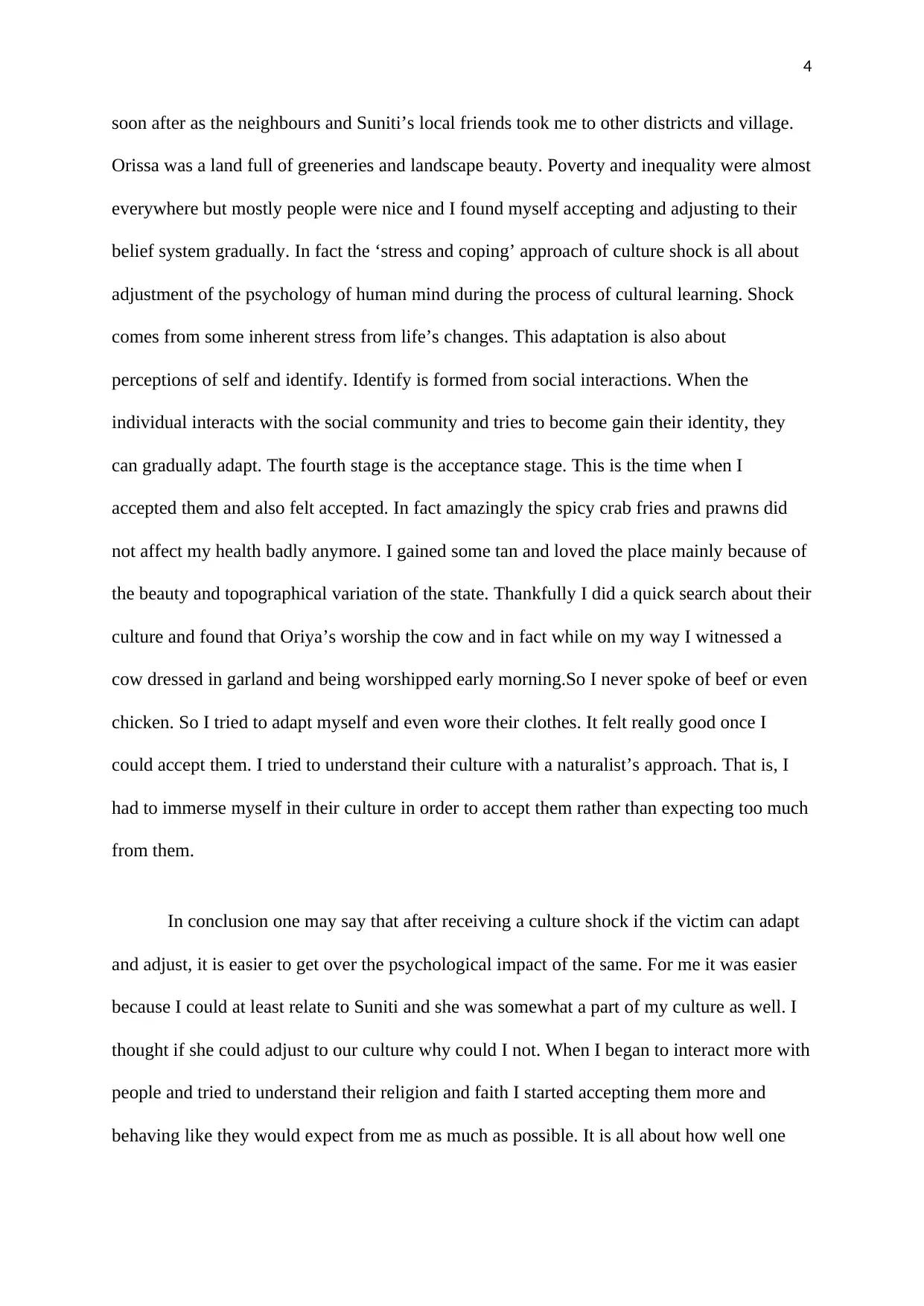Experiencing Culture Shock: A Personal Journey in Orissa, India
VerifiedAdded on 2023/01/18
|5
|1704
|49
Essay
AI Summary
This essay offers a detailed account of a student's experience with culture shock during a month-long visit to Orissa, India. The student, accustomed to the US culture, describes the initial excitement and subsequent challenges encountered upon entering a vastly different cultural environment. The essay outlines the various stages of culture shock, including the honeymoon phase, frustration, and eventual adaptation. The student reflects on the differences in language, religious practices, food, and social customs, highlighting the feeling of being an outsider and the process of adjusting to new norms. The narrative explores the role of personal identity, social interaction, and the psychological aspects of adapting to unfamiliar cultural contexts. Ultimately, the essay emphasizes the importance of understanding, acceptance, and the ability to adapt to overcome the psychological impact of culture shock, offering valuable insights into the process of cultural adjustment.

1
A month’s experience of culture shock
As I stood before the mirror I could not believe my eyes! I looked so different with
small curls, tattoos and beaded junk jewelleries including horse nails. Most importantly my
skin was dark brown now and my eyes had dark circles around. It was a fancy dress
competition in school and I was dressed as a tribal. I was thrilled to do some steps of the
tribal dance, which I had one watched on television. Cultures, customs and rituals have
always interested me. From here comes my love for travel. Going by a formal definition,
Culture is a way of living which comprise of language, rituals, religious practices, aesthetic
and moral values. For every culture these components combine such that each is
distinguishable from one another. We often understand geographical locations from an
individual’s way of living, especially food and clothes. Certain cultures might bear
similarities as well. This is true in case of neighboring nations. Chinese and Japanese people
look and eat almost similar. Geographical distances determine cultural differences. One
cannot count the exact number of different cultures. But one can safely say there are several
of them. Visiting different parts of the world helped sailors like Columbus to learn about
these different aspects. People often passed on stories and narration from one generation to
another. I had heard stories of the aboriginals living in America since the colonial period and
their involvement in Voodoo and black magic based rituals always interested me. This is not
because I wanted to learn them but it was more like a curiosity to know them better and find
reason behind their lifestyles.
Last year an Indian friend of mine invited me to her birthplace, a village in Orissa,
India. She had come to study in the US and I met her while working for a part time job in a
restaurant. As I studied in the maps it is an entirely different continent, Asia. I felt both
excitement and nervousness about what I would face there. But I knew my friend Suniti and
A month’s experience of culture shock
As I stood before the mirror I could not believe my eyes! I looked so different with
small curls, tattoos and beaded junk jewelleries including horse nails. Most importantly my
skin was dark brown now and my eyes had dark circles around. It was a fancy dress
competition in school and I was dressed as a tribal. I was thrilled to do some steps of the
tribal dance, which I had one watched on television. Cultures, customs and rituals have
always interested me. From here comes my love for travel. Going by a formal definition,
Culture is a way of living which comprise of language, rituals, religious practices, aesthetic
and moral values. For every culture these components combine such that each is
distinguishable from one another. We often understand geographical locations from an
individual’s way of living, especially food and clothes. Certain cultures might bear
similarities as well. This is true in case of neighboring nations. Chinese and Japanese people
look and eat almost similar. Geographical distances determine cultural differences. One
cannot count the exact number of different cultures. But one can safely say there are several
of them. Visiting different parts of the world helped sailors like Columbus to learn about
these different aspects. People often passed on stories and narration from one generation to
another. I had heard stories of the aboriginals living in America since the colonial period and
their involvement in Voodoo and black magic based rituals always interested me. This is not
because I wanted to learn them but it was more like a curiosity to know them better and find
reason behind their lifestyles.
Last year an Indian friend of mine invited me to her birthplace, a village in Orissa,
India. She had come to study in the US and I met her while working for a part time job in a
restaurant. As I studied in the maps it is an entirely different continent, Asia. I felt both
excitement and nervousness about what I would face there. But I knew my friend Suniti and
Paraphrase This Document
Need a fresh take? Get an instant paraphrase of this document with our AI Paraphraser

2
trusted her. So I decided to accept her invite and designed a month’s trip. My mother was
initially apprehensive but after talking to my friend they were also excited to learn about the
new place from my visit. After reaching Delhi, we had to take the local flight to
Bhubaneswar, capital of Orissa. I saw old pieces of architectures with dome like tops all over
the place as we travelled. I knew nothing of the languages people spoke there. It was
scorching climate of June. I came to know from Suniti that the state was very religious and
staunchly Hindu. The people believed mainly in one God, Lord Jagannath and the district of
Puri where she stayed had an entire industry centring their Lord. She lived in a joint family
where women wore traditional wear, saree. My friend already changed into her traditional
India wear, salwar suit after reaching the airport. The best thing I found about the place was
the refreshing and awesome ocean, Bay of Bengal. I found people bathing in sarees draped
around themselves and men in shorts. Some women were in some western outfits but unlike
our beaches in the US none were in swimsuits. However from the moment I entered Suniti’s
place, it was as though all my privacy was robbed. I do not mean to say the people were bad,
in fact they were great with their hospitality but they stared at me, my dresses, accessories
and even my hair as if I was from outside the planet. Suniti’sfamily was well educated as they
could converse in English with an Indian accent. But when they spoke among themselves in
Oriya language which in fact appeared to me like some designs in writing, I felt like an
outcast. Their food was spicy and I had to take lots of water and felt sick in the stomach
initially. Later they cooked separately for me on Suniti’s suggestion. I was treated mainly
with rice, dal, chapati, and fish as my regular meal. Meat was not allowed for religious
reason. The biggest shock I received was when I was Suniti and I visited the Lord Jagannath
temple of Puri and I was not allowed inside because I was not a Hindu. This is something
which I could not really accept. Suniti also did not enter because she could not leave me
outside alone. People in their local language mentioned that they I could rather visit Iskon,
trusted her. So I decided to accept her invite and designed a month’s trip. My mother was
initially apprehensive but after talking to my friend they were also excited to learn about the
new place from my visit. After reaching Delhi, we had to take the local flight to
Bhubaneswar, capital of Orissa. I saw old pieces of architectures with dome like tops all over
the place as we travelled. I knew nothing of the languages people spoke there. It was
scorching climate of June. I came to know from Suniti that the state was very religious and
staunchly Hindu. The people believed mainly in one God, Lord Jagannath and the district of
Puri where she stayed had an entire industry centring their Lord. She lived in a joint family
where women wore traditional wear, saree. My friend already changed into her traditional
India wear, salwar suit after reaching the airport. The best thing I found about the place was
the refreshing and awesome ocean, Bay of Bengal. I found people bathing in sarees draped
around themselves and men in shorts. Some women were in some western outfits but unlike
our beaches in the US none were in swimsuits. However from the moment I entered Suniti’s
place, it was as though all my privacy was robbed. I do not mean to say the people were bad,
in fact they were great with their hospitality but they stared at me, my dresses, accessories
and even my hair as if I was from outside the planet. Suniti’sfamily was well educated as they
could converse in English with an Indian accent. But when they spoke among themselves in
Oriya language which in fact appeared to me like some designs in writing, I felt like an
outcast. Their food was spicy and I had to take lots of water and felt sick in the stomach
initially. Later they cooked separately for me on Suniti’s suggestion. I was treated mainly
with rice, dal, chapati, and fish as my regular meal. Meat was not allowed for religious
reason. The biggest shock I received was when I was Suniti and I visited the Lord Jagannath
temple of Puri and I was not allowed inside because I was not a Hindu. This is something
which I could not really accept. Suniti also did not enter because she could not leave me
outside alone. People in their local language mentioned that they I could rather visit Iskon,

3
where Lord Krishna is worshipped by foreigners or Anglo Indians. They were quite gentle
though. But Suniti did not tell me earlier this was the rule of this temple where even a former
Prime Minister of India was not allowed because of her non-Hindu background. India itself
was divided as per three main religions – Christianity, Hinduism and Islam. Orissa was
predominantly a Hindu state. Natives here had some coldness towards other religions.
Culture shock is a kind of experience which can affect us when we face new
circumstances and people from practices much different than what we are used to. It could be
experienced through a simple act of trying a new food. Tourists can also experience such
shocks when they have to travel to a new place and stay there for a considerable time. From
childhood I never travelled to any other country than the US. The shock I received can be
explained in common words by religious faith. A culture shock has four stages usually. The
first stage is the Honeymoon Stage where travellers might become engrossed in the pleasure
of new places, people and food and indulge in them. For me the landscape and their variety of
fish were really appealing. The sea was beautiful and at times I found the priests around
temples dressed in saffron like the monks and took photographs with interest. The fish were
fresh and deliciously cooked unless the spice affected my health. I enjoyed the architecture of
the Sun Temple at Konark and the old stones with had their own charm. Then the second
stage is the frustration stage where the problems start affecting us. The new place here did
have a lot of tourists but the traditional culture was quite different from ours. People staring
at our dresses and looks were embarrassing initially. Lack of understanding their language
and the delicious food and climate affecting my health did cause some frustration. This
frustration reached its peak where I was not allowed inside the temple. This highlighted a
kind of non-acceptance towards my religion and hence my culture. When a tourist visits a
place they want to feel accepted in order to like and feel a part of the same. Here I felt like an
outsider. This was the time when I was feeling homesick. However I adjusted with the place
where Lord Krishna is worshipped by foreigners or Anglo Indians. They were quite gentle
though. But Suniti did not tell me earlier this was the rule of this temple where even a former
Prime Minister of India was not allowed because of her non-Hindu background. India itself
was divided as per three main religions – Christianity, Hinduism and Islam. Orissa was
predominantly a Hindu state. Natives here had some coldness towards other religions.
Culture shock is a kind of experience which can affect us when we face new
circumstances and people from practices much different than what we are used to. It could be
experienced through a simple act of trying a new food. Tourists can also experience such
shocks when they have to travel to a new place and stay there for a considerable time. From
childhood I never travelled to any other country than the US. The shock I received can be
explained in common words by religious faith. A culture shock has four stages usually. The
first stage is the Honeymoon Stage where travellers might become engrossed in the pleasure
of new places, people and food and indulge in them. For me the landscape and their variety of
fish were really appealing. The sea was beautiful and at times I found the priests around
temples dressed in saffron like the monks and took photographs with interest. The fish were
fresh and deliciously cooked unless the spice affected my health. I enjoyed the architecture of
the Sun Temple at Konark and the old stones with had their own charm. Then the second
stage is the frustration stage where the problems start affecting us. The new place here did
have a lot of tourists but the traditional culture was quite different from ours. People staring
at our dresses and looks were embarrassing initially. Lack of understanding their language
and the delicious food and climate affecting my health did cause some frustration. This
frustration reached its peak where I was not allowed inside the temple. This highlighted a
kind of non-acceptance towards my religion and hence my culture. When a tourist visits a
place they want to feel accepted in order to like and feel a part of the same. Here I felt like an
outsider. This was the time when I was feeling homesick. However I adjusted with the place
⊘ This is a preview!⊘
Do you want full access?
Subscribe today to unlock all pages.

Trusted by 1+ million students worldwide

4
soon after as the neighbours and Suniti’s local friends took me to other districts and village.
Orissa was a land full of greeneries and landscape beauty. Poverty and inequality were almost
everywhere but mostly people were nice and I found myself accepting and adjusting to their
belief system gradually. In fact the ‘stress and coping’ approach of culture shock is all about
adjustment of the psychology of human mind during the process of cultural learning. Shock
comes from some inherent stress from life’s changes. This adaptation is also about
perceptions of self and identify. Identify is formed from social interactions. When the
individual interacts with the social community and tries to become gain their identity, they
can gradually adapt. The fourth stage is the acceptance stage. This is the time when I
accepted them and also felt accepted. In fact amazingly the spicy crab fries and prawns did
not affect my health badly anymore. I gained some tan and loved the place mainly because of
the beauty and topographical variation of the state. Thankfully I did a quick search about their
culture and found that Oriya’s worship the cow and in fact while on my way I witnessed a
cow dressed in garland and being worshipped early morning.So I never spoke of beef or even
chicken. So I tried to adapt myself and even wore their clothes. It felt really good once I
could accept them. I tried to understand their culture with a naturalist’s approach. That is, I
had to immerse myself in their culture in order to accept them rather than expecting too much
from them.
In conclusion one may say that after receiving a culture shock if the victim can adapt
and adjust, it is easier to get over the psychological impact of the same. For me it was easier
because I could at least relate to Suniti and she was somewhat a part of my culture as well. I
thought if she could adjust to our culture why could I not. When I began to interact more with
people and tried to understand their religion and faith I started accepting them more and
behaving like they would expect from me as much as possible. It is all about how well one
soon after as the neighbours and Suniti’s local friends took me to other districts and village.
Orissa was a land full of greeneries and landscape beauty. Poverty and inequality were almost
everywhere but mostly people were nice and I found myself accepting and adjusting to their
belief system gradually. In fact the ‘stress and coping’ approach of culture shock is all about
adjustment of the psychology of human mind during the process of cultural learning. Shock
comes from some inherent stress from life’s changes. This adaptation is also about
perceptions of self and identify. Identify is formed from social interactions. When the
individual interacts with the social community and tries to become gain their identity, they
can gradually adapt. The fourth stage is the acceptance stage. This is the time when I
accepted them and also felt accepted. In fact amazingly the spicy crab fries and prawns did
not affect my health badly anymore. I gained some tan and loved the place mainly because of
the beauty and topographical variation of the state. Thankfully I did a quick search about their
culture and found that Oriya’s worship the cow and in fact while on my way I witnessed a
cow dressed in garland and being worshipped early morning.So I never spoke of beef or even
chicken. So I tried to adapt myself and even wore their clothes. It felt really good once I
could accept them. I tried to understand their culture with a naturalist’s approach. That is, I
had to immerse myself in their culture in order to accept them rather than expecting too much
from them.
In conclusion one may say that after receiving a culture shock if the victim can adapt
and adjust, it is easier to get over the psychological impact of the same. For me it was easier
because I could at least relate to Suniti and she was somewhat a part of my culture as well. I
thought if she could adjust to our culture why could I not. When I began to interact more with
people and tried to understand their religion and faith I started accepting them more and
behaving like they would expect from me as much as possible. It is all about how well one
Paraphrase This Document
Need a fresh take? Get an instant paraphrase of this document with our AI Paraphraser

5
can adapt. But before the frustration and shock one would not understand what and how to
adapt. So this experience was a part of learning about a new culture.
can adapt. But before the frustration and shock one would not understand what and how to
adapt. So this experience was a part of learning about a new culture.
1 out of 5
Related Documents
Your All-in-One AI-Powered Toolkit for Academic Success.
+13062052269
info@desklib.com
Available 24*7 on WhatsApp / Email
![[object Object]](/_next/static/media/star-bottom.7253800d.svg)
Unlock your academic potential
Copyright © 2020–2026 A2Z Services. All Rights Reserved. Developed and managed by ZUCOL.





